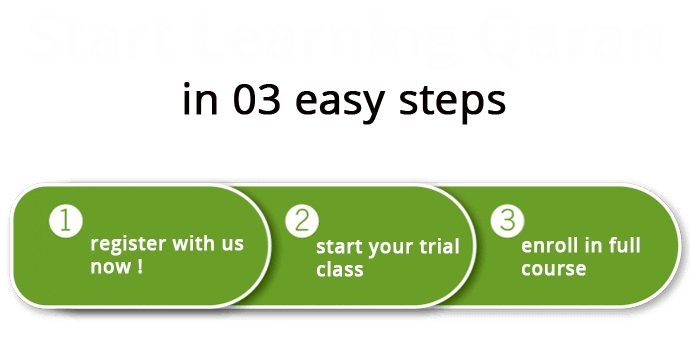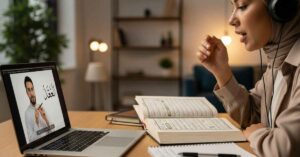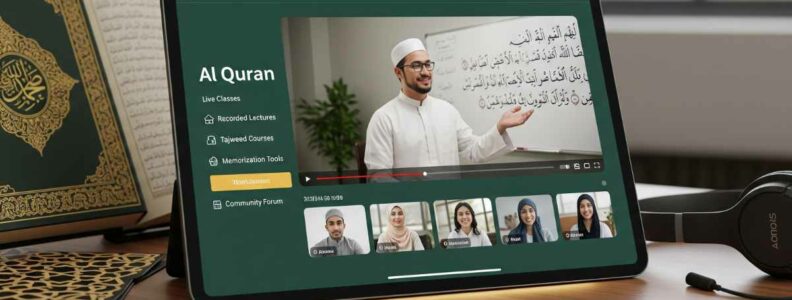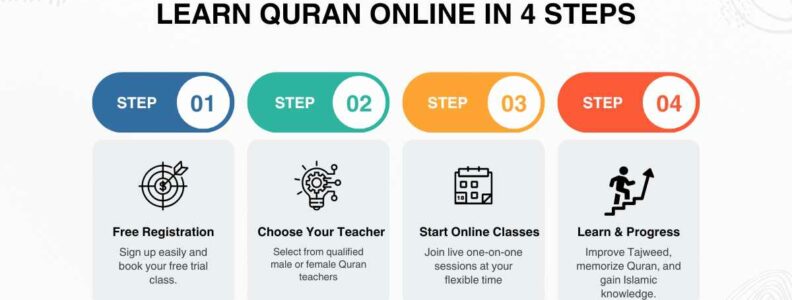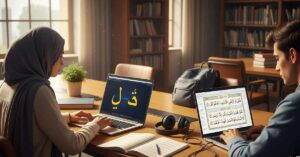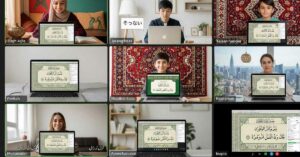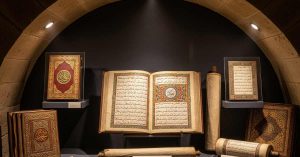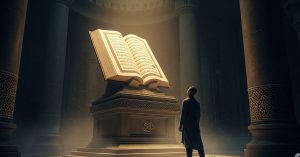Online Quran Learning is now among the most influential means by which Muslims can reach out to the Word of Allah. It is difficult for many individuals in today’s hectic world to visit mosques or madrasas on a daily basis. Work, school, and family obligations tend to complicate conventional routines.
This is where online platforms provide a breakthrough. With Online Quran Learning, you can study the Quran at home, at your own convenience, with teachers from all over the world. It provides flexibility, one-on-one tutoring, and spiritual enrichment while maintaining the authenticity of the Quran intact.
The Shift Toward Online Quran Learning
The journey of Online Quran Learning has become central to Muslims in today’s digital age. From the earliest days of Islam, scholars taught students in mosques, homes, and gatherings. The focus was always on tajweed, memorization, and deep understanding. Yet, as societies grew and lifestyles changed, many Muslims struggled to access these opportunities.
With modern technology, Online Quran Learning has created a bridge. Now, a child in America, a student in Europe, or a parent in Asia can all study under qualified teachers without leaving their homes. This shift marks a new era in Islamic education, making the Quran accessible to every corner of the world.
The Importance of Online Quran Learning in Today’s World
The Quran is not just a book but a guide for every part of life. It offers answers for moral questions, family issues, and even daily struggles. Learning it with proper tajweed and tafseer ensures Muslims stay connected to divine wisdom. In a world filled with distractions, the Quran provides clarity and peace.
For young Muslims growing up in non-Muslim countries, Online Quran Learning plays an even bigger role. It helps preserve Islamic identity, build confidence in faith, and strengthen the link with Allah. Parents who cannot always attend local Islamic centers find online classes a lifeline for their children’s religious upbringing.
Traditional Learning vs. Online Quran Learning
Traditional learning in mosques and madrasas has always carried a strong community feel. Students sit with peers, recite before their teacher, and build discipline through in-person attendance. This method is beautiful but can be limited by location, timing, and availability of teachers.
By contrast, Online Quran Learning offers flexibility. Students can learn at home, choose class times, and connect with teachers from around the world. It does not replace traditional systems but complements them. Families in areas without Islamic centers now find online platforms their main access to qualified scholars.
Key Benefits of Online Quran Learning
One of the strongest benefits of Online Quran Learning is global access. A child in Canada may study tajweed with an Egyptian teacher, while a woman in the UK may learn tafseer with a female scholar in Pakistan. Geography no longer limits education.
Another major advantage is flexibility. Parents can schedule classes after school hours, while professionals can learn at night. Online platforms often provide one-on-one learning, giving students full attention. This personalized experience makes it easier to progress quickly compared to crowded classrooms.
Essential Features of Online Quran Learning Classes
A good online academy does not just stream lessons. It uses tools to make learning smooth and effective. Teachers often share their screens, use digital whiteboards, and provide recordings for revision. Structured courses in tajweed, tafseer, and memorization ensure steady progress.
Another key feature is the availability of female tutors for sisters and children. Many families prefer female teachers for comfort and privacy. Online platforms also track student progress and share feedback with parents. This keeps learning transparent and goal-driven.
Key Features of Online Quran Learning Classes
The Role of Technology in Online Quran Learning
Technology is at the heart of this transformation. Platforms use video conferencing to connect students and teachers. Mobile apps allow learners to revise verses anytime. Even AI-based tools help correct tajweed mistakes by analyzing pronunciation.
Payment systems, scheduling software, and secure logins ensure smooth operation. Parents can monitor their children’s classes through recorded sessions. These advancements make Online Quran Learning more organized than many traditional setups.
How to Choose the Right Online Quran Learning Academy
Not every online academy is the same. It is important to check teacher qualifications. A teacher with ijazah or recognized certification ensures accurate knowledge. Trial classes help families test the platform before committing.
Transparency in pricing and scheduling is another key factor. Good academies share clear plans, offer flexible timings, and display reviews from other students. Choosing carefully ensures that your Quran learning journey stays strong and trustworthy.
Checklist for Choosing an Online Quran Learning Academy
How Online Quran Learning Strengthens Your Connection with Allah’s Word
Learning the Quran is not only about recitation. It is about building a personal relationship with Allah. Online classes make it possible for busy people to maintain this connection daily. Structured schedules encourage discipline while personalized teaching nurtures spiritual growth.
For many students, Online Quran Learning has been life-changing. A child who could not access a local madrasa now memorizes Surah Yaseen. A professional in Dubai learns tafseer in the evenings. These real examples show how technology strengthens the believer’s heart and faith.
Common Challenges of Online Quran Learning and Their Solutions
Like any system, Online Quran Learning has challenges. Internet issues can disturb classes. Families in areas with weak signals often face problems. However, many academies now provide offline recordings, so lessons are never lost.
Another challenge is maintaining motivation. Students may feel distracted at home. The solution is setting fixed times, creating a quiet study space, and involving parents in children’s progress. Time zone differences are also common but can be solved by flexible scheduling.
The Future of Online Quran Learning
The future of Online Quran Learning is exciting. Developers are exploring virtual reality where students can feel like they are inside a mosque while learning. AI will become smarter in correcting tajweed. Gamified apps will make learning engaging for children.
This growth shows that digital platforms are here to stay. Instead of being a replacement, they will continue to support and expand traditional learning, making Quran education available for every Muslim worldwide.
Future Trends in Online Quran Learning
Online Quran Learning for Kids
Children often adapt quickly to new technology, and this makes Online Quran Learning a strong choice for them. With colorful visuals, interactive teaching, and kind tutors, children can build love for the Quran at an early age.
Parents also find comfort knowing that classes are safe and flexible. Scheduling after school or on weekends keeps learning stress-free. Many platforms also offer female tutors who make kids feel more comfortable during sessions.
Online Quran Learning for Sisters and Women
For many sisters, traveling to a madrasa may be difficult due to family or cultural limitations. Online Quran Learning solves this by providing access to female tutors who teach tajweed, tafseer, and memorization in privacy.
Women can learn from home while balancing household duties, childcare, or work. This flexibility allows sisters to remain spiritually connected while respecting their responsibilities.
Online Quran Learning for Busy Professionals
Working adults often struggle to find time for religious study. With Online Quran Learning, professionals can attend classes at night or early in the morning without disturbing their routine.
This flexible approach means a person working full-time in New York or London can still stay connected to the Quran daily. Short, personalized sessions make it possible to progress step by step even with a busy schedule.
Memorization (Hifz) through Online Quran Learning
Memorizing the Quran requires consistency, guidance, and a supportive teacher. Online Quran Learning provides one-on-one sessions that help students stay disciplined in their hifz journey.
Progress tracking tools and digital reminders keep students on schedule. Parents can also monitor how their children are doing, ensuring steady growth toward becoming hafiz.
Tajweed Mastery in Online Quran Learning
Proper tajweed is essential for reciting the Quran correctly. Online platforms often use digital tools that highlight errors in pronunciation and rhythm. Teachers give instant feedback to help students improve.
With regular classes, learners can master tajweed step by step. Many academies also provide recordings so students can review mistakes and practice until they become confident.
FAQ’s
Is Online Quran Learning effective for children?
Yes, children often learn faster online because of one-on-one attention and flexible teaching methods.
How do I know if a Quran teacher is qualified?
Check for ijazah or certification in tajweed and Islamic studies, and read reviews from other students.
Can working professionals benefit from Online Quran Learning?
Yes, flexible timings allow professionals to schedule classes around work hours.
What if my internet is weak?
Most academies provide class recordings, so lessons can be revised even if the live session was interrupted.
Are online classes safe for children?
Yes, reputable platforms use secure systems and provide female tutors for children and sisters. Parents can also monitor sessions.
Conclusion
Online Quran Learning is not just a modern solution but a blessing for Muslims worldwide. It breaks barriers of distance, time, and resources. Families who once struggled to access Quran teachers can now find qualified guidance with a single click. Online learning builds discipline, knowledge, and most importantly, a deeper connection with Allah’s Word. By choosing the right platform and committing to the journey, every believer can embrace technology and stay close to the Quran throughout life.

